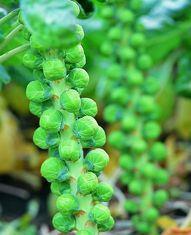
Brussels sprout growers "could double" their yields by growing varieties that are less susceptible to Turnip yellows virus (TuYV), new research has revealed.
TuYV is transmitted by aphids and affects a wide range of Brassica crops. Previous research had identified that the yields of cabbage were reduced by 16-36 per cent, depending on the variety, but little was known on the effect of the virus on other vegetable Brassicas.
A recent Horticultural Development Company (HDC) project (FV 365) carried out by The University of Warwick has discovered high incidences of TuYV in cauliflower and Brussels sprout crops in the 2010-11 season despite low levels of aphids that year. Up to 60 per cent of cauliflower crops and 55 per cent of Brussels sprout crops were infected with the virus.
Controlled experiments showed that Turnip yellows virus induced very little in terms of leaf symptoms in Brussels sprout or cauliflower plants, but yields of Brussels sprouts were significantly reduced. Only by comparing a virus infected plant with an uninfected plant side by side were the differences in yield evident.
As the symptoms are not obvious, growers may be unaware of their crops being affected by this widespread virus.
There was variation between the susceptibility of Brussels sprout varieties to TuYV. Speedia was the least susceptible to the virus and achieved double the marketable yield of virus-infected plants of two other varieties and almost three times the yield of another variety. In spite of this even the highest yielding Brussels sprout variety had its yield reduced by 30 per cent by Turnip yellows virus.
Andy Richardson of Allium and Brassica Centre said: “This ground breaking research has shown that TuYV, can have a significant effect on commercial brassica yields despite the lack of physical symptoms on plants in the field. Further research is underway in 2011 to determine best approach to inhibit/reduce TuYV infections.”
In the future, HDC will investigate the time of infection of Brussels sprouts and winter cauliflower by Turnip yellows virus and the efficacy of a range of insecticidal treatments for controlling the virus.
In the meantime growers can use varieties that are less susceptible to the virus.



